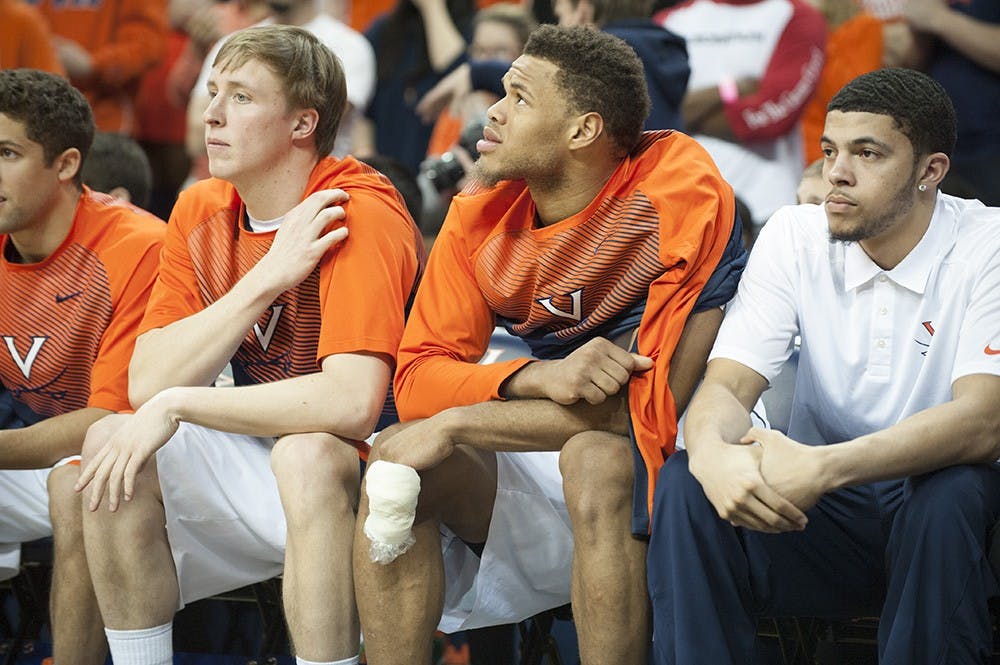It is bad form to think about what is missing on Valentine's Day — that special someone who is no longer there. But on Saturday, despite sharing a special moment with the basketball team I have spent four happy years with, I could not help but feel just a little bit empty inside.
Justin Anderson — the freaky athletic, pinpoint shooting, endlessly energetic, wunderkind — was out of the lineup, relegated to spectator status by a finger injury that will sideline him for several more weeks.
Virginia's victory against Wake Forest — its 23rd in 24 games this season — should have made me appreciate all that the Cavaliers have meant to me during my time in Charlottesville. It was the kind of grinding, scrappy, bend-but-don't-break, classic Cavalier performance that I have grown to love and expect at John Paul Jones Arena.
I should have walked out of the building smiling and glowing with pride because my Cavaliers had matched their best start in program history and improved to 11-1 in ACC play. They had widened their margin atop the ACC standings by overcoming their largest halftime deficit of the season. They had gotten a stop when it mattered most and come through in the clutch once again.
But perfection has made me jaded. Virginia's 19 consecutive wins to start the season came in such incredible fashion that simply coming out on top no longer satisfies me. I have come to expect dominance, mixed with genuine humility and a small dose of flair. I expect a 20-point win, a few SportsCenter Top 10 plays contenders and a postgame press conference where the team finds fault with its performance nonetheless.
Perhaps most importantly, I have come to expect the 6-foot-6 swingman nicknamed “Simba” to throw down at least one reverse slam, knock down a couple of 3-pointers and make the crowd holler with his infectious energy and passion. That is why Saturday's victory felt like reason to fret rather than to celebrate: iit ratcheted up fears that Anderson's extended absence until March will prevent Virginia from reaching the level of play fans have grown used to.
The Cavaliers, so accustomed to rising above the modest expectations foisted upon them by outsiders, now appear to be something far less than what their No. 2 ranking indicates. Without Anderson against NC State and Wake Forest, Virginia notched two of its three narrowest wins of the season, despite facing teams ranked in the bottom half of the ACC.
Several times Saturday against the Demon Deacons Virginia ran plays that would have been effective had Anderson been on the floor. They kicked the ball out to open 3-point shooters repeatedly, but instead of the ACC's best long-range marksman on the other end, it was guards London Perrantes and Malcolm Brogdon firing away from deep. Together, they missed all eight of their shots from beyond the arc.
While Evan Nolte filled in admirably, even recovering from a finger injury of his own to make a pair of 3-pointers after the break, he is — by his own admission — not the same player as Anderson. He cannot sky to the rim for alley-oops or putback slams. He is not a dynamic playmaker or ball handler. He cannot singlehandedly ignite the crowd with a highlight-reel block or thunderous dunk in transition.
Nolte is a player that can hold his own defensively, knock down open shots when they come to him and facilitate the offense. The problem is that the Cavaliers have come to depend on deploying a superstar at the position, one they can pair with Brogdon to make plays down the stretch.
In the postgame press conferences Saturday after the team's one-point win, I began interviews with players by asking a few obligatory softballs: How were you able to close out the victory? What was the key to getting that last stop? Where do you guys need to improve?
But I lacked vigor and interest until I shifted topics to what was really on my mind after two straight surprisingly narrow victories.
Who are the Virginia Cavaliers without Justin Anderson?
We are starting to get an answer to that question, and the early returns suggest something that may be unsettling to Virginia fans. Without their emotional leader and one of the most talented wing players in the ACC, the Cavaliers are a very good team — but are also very far from being a great team.
They are talented enough defensively to remain competitive with almost every team in the ACC but not explosive enough offensively to make many foes feel uncomfortable. They are capable of making a deep postseason run, but by no means should they be expected to do so.
In other words, they resemble the Virginia teams from 2011-12 and 2012-13, squads that masked offensive deficiencies with heady play and textbook defense to become tournament-worthy groups.
This is not a knock on Virginia. There is likely not a single team in the country that could lose arguably its best player on Saturday and wake up on Sunday as championship contenders.
Over the next 21-35 days, the timeline for Anderson's return from injury — but who's counting? — Virginia must figure it out who it is, if not the team that has beaten five opponents ranked in the AP Top 25 and reached numerous milestones not seen in Charlottesville since the 1980s. And they must figure it out quickly, with the prospect of postseason play looming and the status of their linchpin unclear for the start of the ACC Tournament in three weeks.
Perhaps after yet another thrilling win, I should just appreciate the team I have and not lament that a piece is missing. But Valentine's Day is not just about loving what we have. It is also a day when we expect a pleasant surprise from those that have consistently impressed us the most.







